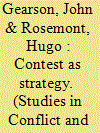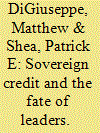| Srl | Item |
| 1 |
ID:
142097


|
|
|
|
|
| Summary/Abstract |
The appropriateness of the United Kingdom's counterterrorism strategy, known as CONTEST, divides opinion. This article reassesses CONTEST as strategy rather than simply examining its effectiveness as policy, or critiquing its individual parts. Reviewing the development of CONTEST in the context of wider analytical discussions on what makes for good strategy, the authors argue that several important strands of CONTEST are either underdeveloped or not yet as “strategic” as some analysts and the U.K. government itself have professed them to be. Fresh thinking on aspects of counterterrorism is urgently needed to counter the challenge of contemporary and future terrorism.
|
|
|
|
|
|
|
|
|
|
|
|
|
|
|
|
| 2 |
ID:
086948


|
|
|
|
|
| Publication |
2009.
|
| Summary/Abstract |
The resignation of Tony Blair as British Prime Minister and the transition from Bush to Obama in the US mark the end of the second revival of the US-UK special relationship. The classic era of the special relationship began under the Labour government in the 1940s, though it was Winston Churchill who inspired the concept. It ended with the resignation of Harold Macmillan in 1963. Margaret Thatcher revived close personal relations with the US President as a guiding principle of UK foreign policy and Tony Blair successfully revived them again, even though the end of the Cold War had transformed the framework of transatlantic relations. Over the past 60 years US-UK relations have embedded specific security arrangements which have persisted, largely unquestioned, through the ups and downs of political relations at the top: close links between the two countries' armed forces; access to defence technology and procurement; intelligence ties through the UKUSA Agreement; a semi-independent nuclear deterrent and provision of military bases in the UK and its overseas territories. Public debate on the costs and benefits of these links has been limited; successive governments have discouraged a wider debate. The Obama administration enters office with few of the personal ties to Britain and to English culture, which have underpinned the special relationship. Earlier US administrations have approached relations with the UK from the perspective of US interests, while many British political leaders have felt-and have hoped to find in Washington-a sentimental attachment to Anglo-American partnership. British foreign policy would benefit from a reassessment of the structures of US-UK relations in terms of British interests, costs and benefits.
|
|
|
|
|
|
|
|
|
|
|
|
|
|
|
|
| 3 |
ID:
141853


|
|
|
|
|
| Summary/Abstract |
In this article, we contend that the “democratic advantage” literature (i) exaggerates the potential political backlash from credit downgrades in democracies; and (ii) overlooks the importance of sovereign credit to nondemocratic leaders. We argue that nondemocratic regimes receive a higher marginal political benefit from credit compared to democratic regimes. Consequently, changes in credit prices or credit access affect nondemocratic leaders' tenure more than democratic leaders' tenure. To test this argument, we provide the first statistical examination of the electoral punishment mechanism of the “democratic advantage.” Our duration analysis shows that credit downgrades increase nondemocratic leaders' vulnerability more than that of their democratic peers. Our research reinforces the growing concerns about the conventional views about regime type, domestic constraints, and leaders' preferences toward sovereign credit and other political processes.
|
|
|
|
|
|
|
|
|
|
|
|
|
|
|
|